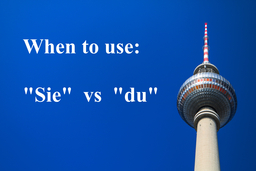GamesforLanguage: When to use “Sie” vs. “du”
 English speakers have to face another challenge when learning German: when to use the formal “Sie” vs. the familiar “du”. In English such differentiation does not exist.
English speakers have to face another challenge when learning German: when to use the formal “Sie” vs. the familiar “du”. In English such differentiation does not exist.
(I'd like to acknowledge TalkinFrench.com's recent post on the similar topic “Tu” vs. “Vous”, as the inspiration for this German “guide,” as there are many similarities – but also differences – how both languages use the formal and familiar form of address.)
What also complicates the matter is that the internet and the influx of English into the German language has softened the clear du/Sie demarcation lines of the past. As we'll see later, it has also introduced new combinations of first name with the formal “Sie”.
Also, the “Sie” vs. “du” differentiation varies greatly not only at different levels of age and social connection, but also at different levels of society, community, and profession in German-speaking countries.
And as you interact socially with German speakers, you'll not only have to know whether and when to use “Sie” or “du”, but you'll also have to be able to adjust your speech by using the correct verb forms.
When to use the German “Sie” for “you”
There are some clear basic rules: You use “Sie” with: anybody you're meeting for the first time; a stranger on the street e.g. someone whom you're asking for help/directions:
you're asking for help/directions:
• “Könnten Sie mir bitte helfen/sagen...” ; at a ticket window buying a train ticket, at an airline counter, information booths, etc.; shopkeepers; and your co-workers when you start a new job (but note exceptions below).
• Anybody quite a bit older than you.
• Anyone to whom you want or need to be respectful - a teacher, a boss, clients, policemen, or other officials.
• Any groups or audience you may be addressing in a speech – unless it's your sports team, or group of friends, when “Sie” becomes “ihr” (and those exceptions are also noted below).
In general, you're much better off erring on the side of using “Sie” rather than “du” when you meet somebody for the first time. (The young traveler Michael of our German 1 course does so in this MP3 audio clip, as he didn't know that German students “sich duzen” i.e. they use the familiar “du”.)
The “Sie” puts a distance between you and the other person, and in some circumstances this may be seen as aloofness.
But it's much better to be “invited” to use the familiar “du”, than to be somewhat embarrassed when the other person ignores your “du” and responds by using the “Sie”, thereby clearly pointing out your transgression.
When to Use the German“du” for “you”
 • In general, all family members and close friends use “du”.
• In general, all family members and close friends use “du”.
• Classmates
• Students and colleagues that you're on amicable terms with
• Children up to their late teenage/early adult years
• Members of sports clubs and political parties typical use “du” (although there again are hierarchical and age differences that may create exceptions).
• Clearly, for animals, pets, inanimate objects, etc. you use “du” as well.
When you've offered or have been offered the familiar “du”: “Wollen wir uns nicht “duzen”? At social gatherings in the past, the invitation to use “du” was often accompanied by a kiss or peck on the cheek (sometimes reluctantly accepted as in the above photo).
It was also often done by linking arms while taking a sip from your drink, and called “auf Brüderschaft trinken” (drink to brotherhood). But I must confess I have not seen or experienced this old tradition for a long time – maybe because I haven't been at those type of parties for a while.
Sample Situations
The rules mentioned above may not be cut-and-dried, so let’s have a look at specific examples below.
Family members: Use “du”
Regardless of age, family members use “du” when talking to each other.
Each year we join a Dutch family reunion in the Netherlands. About 100 members now living in various countries get together for a weekend. Whether we're speaking, Dutch, German, or French – even with family members we may not have met before – we always use the familiar “je/jij”, “du”, or “tu”.
Strangers in the 15- to 25-year-old age range
Young adults in this age group who meet each other for the first time, often use “du”, especially if they come from a similar social group, are students, etc.
Co-workers or colleagues
It very much depends on the type of company and the policies and traditions established by the “old hands”. In hierarchical organizations such as banks, insurance companies, government, the military, as well as schools, universities, etc., it's better to start out using “Sie”.
Once your colleagues offer you the familiar “du”, you have been accepted as part of the group and can now choose when to do the same for any newcomers.
One interesting change is occurring in many multinational firms in German-speaking countries: Rather than using the family name with the formal “Sie”, as was the norm, now colleagues often interact by using their first name while still using “Sie”.
Business or professional contacts: use “Sie”
When meeting new contacts in your business or profession, you should always use “Sie”. Only when you start to interact socially or get close enough to offer/be offered the familiar “du” would this change.
Teacher to students:
I went to school in Bad Nauheim, Germany. I remember that at the beginning of the 11th grade, and for the last three years of high school, until the “Abitur”, our teachers addressed us with “Sie”.
A friend who is a high-school teacher in Freiburg, Germany, confirmed that the same is still true today in the high school, where she teaches.
In other parts of Germany, or Austria, Switzerland, South-Tyrol, Luxembourg, Alsace-Lorraine, etc. where German is spoken, the school rules may be different.
"Sie" + first name
German speakers typically address persons, with whom they have not agreed on using the familiar "du", with their last name. And it is not unusual, even for long-time acquaintances, to use both the formal "Sie" and their last names.
However, likely because of the influx of English in movies and on the internet, the use of the first name together with the formal “Sie” has become common in many companies, especially those with international connections.
We'd like very much to hear from residents in those areas about the use of “Sie” and “du”, so we can add a postscript.
“Sie” and “du” in other parts of speech
The formal “Sie” form (as well as “Ihre, Ihnen”) is capitalized, mainly to distinguish it from “sie”, which means both “they and “she”.
The written sentence: “Ich sehe, dass Sie gewonnen haben”. (I see that you have won.) can therefore not be confused with: “Ich sehe, dass sie gewonnen haben”. (I see that they have won.) When you HEAR a similar sentence, only the context will tell you who is meant by sie/Sie.
As you will know, using “du” and “Sie” directly affects the verb conjugations. But let’s look at the other “du” and “Sie” forms:
• Nouns: das “Duzen” (saying “du” to each other) and das “Siezen” (saying “Sie” to each other)
• Verbs: “duzen” (to use “du”) and “siezen” (to use “Sie”)
• Subject pronoun: “du” - Du bist jung; vs. “Sie” - Sie sind alt.
• Direct object pronoun: “dich” - Ich sehe dich; vs. “Sie” - Ich sehe Sie.
• Indirect object pronoun: “dir” - Ich gebe dir das Buch; vs. “Ihnen” - Ich gebe Ihnen das Buch.
If you find yourself really unsure whether the situation calls for “du” or “Sie”, don’t worry, it’s okay to ask. Here's what you could say in navigating the move from “Sie” to “du”:
• Wir könnten uns doch duzen! (Surely we could say “du”! [to each other])
• Wir sollten uns duzen! (We should say “du”. [to each other])
• Darf ich Sie duzen? (May I say “du” to you?)
• Stört es Sie, wenn wir uns duzen? (Does it bother you, if we say “du”? [to each other])
• Sagen wir doch du zueinander! (Let's say “du” to each other.)
If you would like to set the level of familiarity during your conversation, here are some useful phrases:
• Du kannst mich duzen. (You can address me with "du".)
• Ich glaube nicht, dass wir “per du” sind. (I don't think we'vebeen using "du" [with each other]).
• Ich möchte nicht geduzt werden. (I don't like being addressed with “du”.)
Frequently Asked Questions About “sie” and “du”
By now you probably have a good idea how to use “Sie” and “du”. All that remains is finding the opportunity to turn theory into practice. Here are some frequently asked questions with their respective answers.
Q: While you've pointed out that “geduzt zu werden” can be seen as impolite or even offensive by someone, could the reverse also be true: using “Sie” instead of “du”?
A: There are few instances in which someone would feel offended, but I can think of one: Let's say you and a younger person attend a social event, maybe an office party (and you are the person's boss). You have a few drinks together and you offer him or her the familiar “du”. The next day, however, either because you don't remember, or you've changed your mind, you again use “Sie”. The younger person may now feel bad and not dare to ask you why you've reverted back to “Sie”.
While addressing each other with “Sie” at work and with “du” at social interactions may be more the exception than the rule today, it may still be the code of conduct in hierarchical organizations.
Q: Is it okay to start a conversation with someone using “Sie” and later in the conversation switch to “du”?
A: Well, if the other person reminds you that you were already using the familiar “du” before, it's quite obvious that you should switch. Or, if you hear the invitation “Sagen wir doch du zueinander!” then it's a no-brainer either.
Also, if you're both of similar age, social status, etc. and the other person repeatedly used “du”, you could very well switch as well – at least that's what I would do.
Q: Is it all right if one person uses “du” while the other uses “Sie”?
A: As we have seen, this indeed is the typical situation between children and adults, students and teachers. It used to be quite normal in the past between aristocrats and commoners, bosses and workers, i.e. people of different rank and status etc., but in today's democratic German-speaking societies it would seem unusual between adults.
Q: Do the formal “Sie” and plural “sie” always have the same conjugation?
A: Yes, the conjugation of verbs with the formal “Sie” (you) and the plural “sie” (they) is always exactly the same.
Q: The conjugation of verbs is different for “du” and “Sie”, right?
Yes, the conjugation of verbs with the familiar “du” and the formal “Sie” is different as shown with these examples, while the English translation remains the same :
• “Du siehst mich.” - “Sie sehen mich. (You see me.)
• “Du hörst uns.” - “Sie hören uns.” (You see us.)
• “Du liebst ihn.” - “Sie lieben ihn.” (You love him.)
• “Du bist schön.” - “Sie sind schön.” (You are beautiful.)
And, if there are any more questions about the use of “Sie” vs. “du”, just drop us a line. We'll be happy to answer them or find out.
We also welcome any comments or observations that are different from our experience and explanations above.
Bio: Peter Rettig is the co-founder of Gamesforlanguage.com. He is a lifelong language learner, growing up in Austria, Germany, and Switzerland. You can follow him on Facebook, Twitter and Instagram, and leave any comments with contact or below.
You Want to Practice Your German?
Our games and travel-story based courses are also a great way to practice your German.
With our German 1 and 2 courses you'll learn and practice German for FREE - with stories of a young man traveling through Germany and - its sequel - solving a "Blüten"-mystery in Berlin. "The Story" and easy games will let you forget that you are actually learning German!
And you can also listen to both Stories by clicking on German 1 or German 2 on our Podcast page
If travel to Germany is in your near future, you may also enjoy our post: 4 Fun German Language Games Before You Travel.
